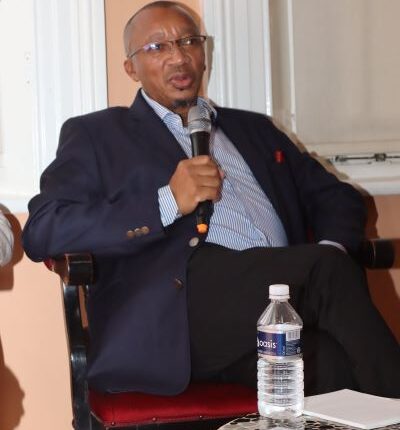Pharasi tells the story of a non-combatant in exile
By Karabo Siyoko
Olehile Bada Pharasi launched his book titled “Exile! Was it worth it?”.
A memoir that brings a remarkable insight into his life during the struggle for freedom. The launch was held at McGregor museum last February with 70 guests, including his family, former classmates, comrades and friends in attendance.
Pharasi grew up in Galeshewe, Number Two location. He was born in 1956, the second last born of eleven children. He is married with two sons.
He attended Montshiwa and Boitshoko primaries and matriculated from St Boniface High school. In 1976 he enrolled at the University of the North, now known as the University of Limpopo. He studied towards a Bachelor in Pharmacy (BPharm). However, because of the Soweto uprising, his studies were interrupted.
Pharasi’s memoir is a rare account of a non-combatant member of the liberation movement. Taking us from his childhood, including exploits leading to a secret flight into exile via Botswana and into Tanzania, where he stayed for some time before he left for Bulgaria.
While in Tanzania, he worked for Radio Freedom at some stage, editing and being behind the mic.
Some of the 1976 students who skipped the country and joined any of the liberation movements, such as the ANC faced the choice of either joining the military or pursuing their studies. He chose to continue with his studies.
“My plan to study journalism was not such a good one as I was going to do it part-time by correspondence while getting a job. My family and friends encouraged me to go to university instead. My favourite subject was chemistry. I decided to go for a course with lots of chemistry which is how I came to enroll in pharmacy”, added Pharasi.
In 1983 he completed a Master’s degree in Industrial Pharmacy at a Bulgarian university named the Medical Academy of Sophia. After that, he went to Zimbabwe for an internship.
In 1991 he returned to South Africa and was appointed researcher at the Centre for Health at the Wits Medical School. Pharasi is currently the chief executive officer of the Innovative Pharmaceutical Association of South Africa.
The urge to write had always been there long after he came home. He registered for an online writing course for non-fiction memoirs with the University of Cape Town.
“However, It does not mean to say you need to do a course to write as long as you believe in your story and telling it. When writing a memoir, people must hear your life and story. If you think it is intriguing enough, do it”, he added.
At the end of the course at the University of Cape Town, Pharasi had written about 5000 words on how he left the country and ended up in Botswana. But then decided he may as well do the whole story of his life in exile.
He prepared an outline which he started writing in 2013, he would write a bit by that time and some months would pass without writing. In 2019 he started to write the bulk of the book during his spare time and continued to write regularly but accelerated the pace when Covid-19 struck.
“I decided I could not afford to die of Covid before completing this project. So, this fear spurred me to complete the manuscript’s first draft around February-March 2021,” said Pharasi.
“I realised that many people did not understand what exile was about and all sorts of myths were being spread. To write this story was partly to set the record straight. It is also about the experiences of those in the camps doing military work. I felt it was important that people understand the role of non-combatants in the liberation movements”.
He added that he needed his family members, especially the younger ones, to fully understand what happened to him during the 14 years he was out of the country.
“Finally, through writing, I am also hoping to inspire young people and even those not so young but who may have compelling stories to tell and write”, said Pharasi.
Sunet Swanepoel, Chief Executive Officer for McGregor Museum thanked Pharasi for donating a percentage of the sales at the launch. “I hope more and more activists take time to capture their stories in a book or any other form”, concluded Swanepoel.


Comments are closed.